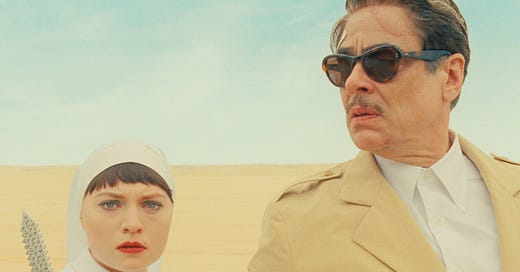The Personal
Many of Wes Anderson’s films are about grieving the death of someone close to you, but this one is about the act of dying. Perhaps it is notable that this recent string of films have been made by a man on the wrong side of 50, who is starting to recognize the light at the end of the tunnel. Our point of view has moved from the sons and daughters of Tenenbaums to Royal himself. The Scheme’s plot involves a legacy of capital and art being passed down from a wealthy patriarch approaching his demise to his one daughter, much to the chagrin of his dozen adopted sons, in something of an inverted Lear riff. Speaking of Capital and Art, this is the first film I’ve ever seen that gives full credit (with images) to every painting that was on loan and displayed as set decoration in the film.
The Political
Not since The Grand Budapest Hotel has Wes Anderson made a film with such strong ideological convictions. Western involvement in the middle-east is nothing more than a scheme in this world, built upon slave labor and famine. The industrial developments that Zsa Zsa Korda (Del Toro) and his daughter Sister Liesl (Threapleton) visit to amend contracts depict signage in alternating Arabic and Hebrew lettering. Their liaison is Michael Cera as a grown-up version of the kids that used to show you bugs, later revealed to be working for the American government. Johannson’s site, the “Grossman Utopia”, alongside her accent, implicate Israel as yet another arm of the white schematic development of the region.
The Aesthetic
This is the first film of Anderson’s not shot by Robert Yeoman, but Bruno Delbonnel does an admirable job of picking up where the former left off. A unique tendency here is in the close-ups, often floating with the slightest handheld air, and implicating a character’s point of view. There is a fight scene toward the end with a sequence played fast and loose to the point where you can almost forget what director you’re watching. It’s not a particularly well-staged fight scene, and goes on for far too long, but was the first time I’ve seen Anderson not shy away from combat via comedic whip pans and off-screen action. The biggest oversight in Andersonian studies is that most critics fail to link Yeoman’s work with production designer Adam Stockhausen, who has been on the Indian Paintbrush crew since Budapest. Yeoman and Stockhausen had the most synergy between a DP and PD that I’ve ever recognized, and viewers were right to credit the auteur for this distinct aesthetic sensibility he melds between his two most vital department heads. Although the eagle-eyed viewer may notice some textural differences in Delbonnel’s images from Yeoman’s, (particularly the lightning-speed horizontal tracking shots) it is Stockhausen and Anderson’’s attention to detail in the design of the film that retains the signature aesthetic. The MVP props include Sister Liesl’s bedazzled rosary and dagger (which signify her shift from asceticism to aestheticism, from the Church to her father) and the chintzy mobile lie detector unit.
Altogether, I find it hard to write about Wes Anderson’s films at this point in any context but his own filmography, and while some frustrated viewers fatigued with the American Truffaut’s conventions may find this to be “up his own ass” territory, I find it to be a sign of an auteur in the truest sense of the word. At the end of this capsule, I would also like to let the reader know that this movie, like everything Wes Anderson has ever done, is quite funny.
THE LIST
With the year about halfway through, I always like to take the temperature on FOTY discourse. Is the film of the year ever released in the first six months? Almost never. But it’s a good way to judge both the mainstream fair and the festival films that got held over for the non-elite movie watching public. June/July lists are a great way to look back at a year in film before anything “important” or potentially Oscar-worthy starts to take over the discussion. I will limit myself to one sentence per movie.
The Shrouds - David Cronenberg
Remember that part in Sabbath’s Theater where Mickey finds out he’s not the only one who's been making foul visits to Drenka’s grave?Caught by the Tides - Jia Zhangke
Reviewed hereEephus - Carson Lund
A baseball hangout comedy that’s more about time than sports.The Code - Eugene Kotlyarenko
A miracle of retrofuturism, a film from the 1930s and 2030s.The Phoenician Scheme - Wes Anderson
Reviewed above. Duh.Hard Truths - Mike Leigh
ROLLING PIN 101, maybe the best Pissed Mom performance of all time.Den of Thieves 2 - Christian Gudagest
It’s really stupid and really fun.Pavements - Alex Ross Perry
”Freeze, don’t move, you’ve been chosen as an extra in the movie adaptation of the sequel to your life”Mickey 17 - Bong Joon Ho
I know I sounded very mixed in my review, but that’s the kind of year we’re in.Woman in the Yard - Jaume Collet-Serra
The scariest shadows I’ve seen in years, but the actual movie is just fine.






very good review